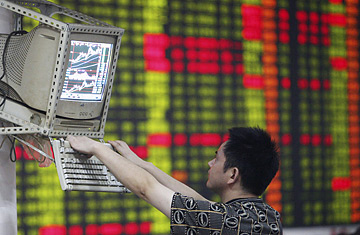
A man examines a data screen at the Beijing Stock Exchange.
For financial markets all over the world, rockier now than they've been in over half a decade, rarely has an investing verity been more important: information — solid, accurate information — is as good as gold. When market pundits and analysts prattle on these days about the "re-rating of risk" and the lack of "liquidity" in the markets, what they are really talking about are gauges, however crude, of ignorance — and of fear based on ignorance. In the unfolding financial story of the year — the bursting of the global economy's credit bubble — "the biggest problem is we don't know what we don't know," says Khiem Do, head of Asian Multi Asset investing at Barings Asset Management in Hong Kong.
What, exactly, does that mean? Let's start, first, with what we do know: financial institutions are asking a much higher price to lend their money to those who would borrow it than they were just a little while ago. In some cases, they are not willing to lend it at all. That's as true for global giants such as Citibank as it is for your local mortgage broker. Clearly, that has consequences for growth. Everyone knows the U.S. housing market continues to plummet, but the rise in interest rates that we've seen lately will crimp growth — reducing investment globally. Fewer businesses will expand, start up or open new factories — and that will pinch profits going forward, which, in turn, will crimp investments in new businesses or factories even more.
But the core of this is, as Barings' Khiem says, a lack of information. It all started as a problem that seemed both predictable and containable: U.S. borrowers with bad credit history started (surprise, surprise!) defaulting on their mortgages. But that meant trouble for more than just the mortgage company or the bank that made the loan originally. Since the 1980s, individual mortgages have been packaged into bundles (so-called mortgage-backed securities) and resold to investors. Soon after came so-called derivatives, exceedingly complex investments that often trade based on the relationship between two or more underlying markets — mortgage-backed securities, say, and 10-year Treasurys. These products have been sold and resold literally the world over, and it's no surprise why: in an era of low inflation, low interest rates and strong economic growth, products tied to subprime mortgages offered higher returns than many other interest-bearing investments. For a good while, it seemed like easy money, and these investments spread throughout the global economy.
The problem is, now that this market has collapsed, figuring out who owns all this worthless paper. Think that's easy? Two weeks ago, no less than the CEO of BNP Paribas, the big French bank, said, in effect, no worries, folks. Its exposure to this stuff was, as he put it, "negligible." Yet last week, BNP had to shut down three of its own investment funds because of its exposure to investments linked to the subprime debacle. When the CEO doesn't know, that is the very definition of "not knowing what we don't know." "No one has a clue what they're sat on," says Gabriel Stein, chief international economist at Lombard Street Research in London. Dutch and German banks recently admitted that these bad debts had dented their earnings as well. And there's probably more bad news to come, says Stein: "It's noticeable that no British bank has said 'this is our exposure.' The idea that they're the only ones, through brilliance, not exposed is fairly unlikely."
Not that this phenomenon is limited to Europe. South Korean and Taiwanese banks got hammered on their respective stock exchanges last week because of fear — based, again, on a lack of knowledge — that they had bought a lot of paper tied to the subprime debt market. And in Hong Kong, Goldman Sachs issued a warning recently that some of the biggest mainland Chinese banks that trade on the Hong Kong exchange — including the Bank of China — were also exposed. In early August a spokesman for the BOC had said its first-half losses tied to subprime investments were "minimal." But in the wake of the nasty BNP Paribas surprise half a world away, investors everywhere were understandably — and increasingly — skeptical. Did top management at any financial institution anywhere really know the extent of the damage? Did regulators?
No wonder that last week, central banks — like a frazzled mother jamming a pacifier into a wailing infant's mouth — rushed in to try to calm the incipient panic, shoving $300 billion of fresh cash into the credit markets to make sure they didn't seize up entirely. (The Bank of Japan and the eurozone's European Central Bank both pumped in additional funds on Monday.) For the moment, the moves had their intended effects: following minimal losses in New York on Friday, Asian and European bourses on Monday traded mostly higher. Knowing now that central banks are willing to step in suggests "there should be less sensitivity to bad losses," reckons Matthew Sharratt, an economist with Bank of America in London. But the calm is not likely to last, not in this environment. "The ripple effects of the end of the credit bubble will be enormous — it will hurt economies everywhere," says Shanghai-based economist Andy Xie. "It's just not clear right now what the next piece of bad news is, or where it will come from." And that's a big part of the problem. In financial markets, ignorance is never, ever bliss.
With reporting by Adam Smith/London
